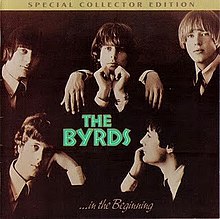
The Byrds were an American rock band formed in Los Angeles, California, in 1964. The band underwent multiple lineup changes throughout its existence, with frontman Roger McGuinn remaining the sole consistent member. Although their time as one of the most popular groups in the world only lasted for a short period in the mid-1960s, the Byrds are considered by critics to be among the most influential rock acts of their era. Their signature blend of clear harmony singing and McGuinn's jangly 12-string Rickenbacker guitar was "absorbed into the vocabulary of rock" and has continued to be influential.
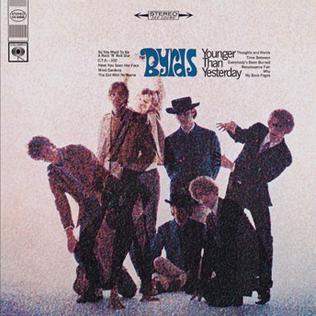
Younger Than Yesterday is the fourth studio album by the American rock band the Byrds and was released on February 6, 1967, on Columbia Records. It saw the band continuing to integrate elements of psychedelia and jazz into their music, a process they had begun on their previous album, Fifth Dimension. In addition, the album captured the band and record producer Gary Usher experimenting with new musical textures, including brass instruments, reverse tape effects and an electronic oscillator.
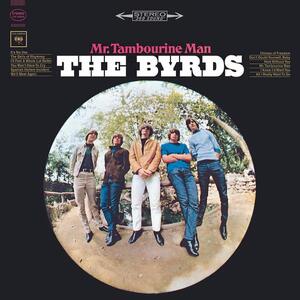
Mr. Tambourine Man is the debut studio album by the American rock band the Byrds and was released on June 21, 1965, by Columbia Records. The album is characterized by the Byrds' signature sound of Jim McGuinn's 12-string Rickenbacker guitar and the band's complex harmony singing. The material on the album mostly consists of cover versions of folk songs, primarily composed by Bob Dylan, and originals written or co-written by singer Gene Clark. Along with the Dylan-penned single of the same name, Mr. Tambourine Man established the band as an internationally successful act and is widely regarded by critics as representing the first effective American challenge to the chart dominance of the Beatles and other British Invasion bands during the mid-1960s.
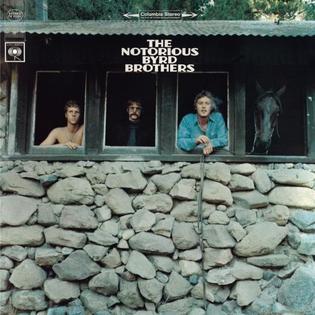
The Notorious Byrd Brothers is the fifth album by the American rock band the Byrds, and was released in January 1968, on Columbia Records. The album represents the pinnacle of the Byrds' late-'60s musical experimentation, with the band blending together elements of psychedelia, folk rock, country, electronic music, baroque pop, and jazz. With producer Gary Usher, they made extensive use of a number of studio effects and production techniques, including phasing, flanging, and spatial panning. The Byrds also introduced the sound of the pedal steel guitar and the Moog modular synthesizer into their music, making it one of the first LP releases on which the Moog appears.

Turn! Turn! Turn! is the second studio album by American rock band the Byrds, released on December 6, 1965, by Columbia Records. Like its predecessor, Mr. Tambourine Man, the album epitomized the folk rock genre and continued the band's successful mix of vocal harmony and jangly twelve-string Rickenbacker guitar. The album's lead single and title track, "Turn! Turn! Turn!", which was adapted by Pete Seeger from text in the Book of Ecclesiastes, had previously been arranged in a chamber-folk style by the Byrd's lead guitarist Jim McGuinn for folk singer Judy Collins' third album, but the arrangement he used for the Byrds' recording of the song utilizes the same folk-rock style as the band's previous hit singles.

Fifth Dimension is the third album by the American rock band the Byrds and was released in July 1966 on Columbia Records. Most of the album was recorded following the February 1966 departure of the band's principal songwriter Gene Clark. In an attempt to compensate for Clark's absence, guitarists Jim McGuinn and David Crosby increased their songwriting output. In spite of this, the loss of Clark resulted in an album with four cover versions and an instrumental, which critics have described as "wildly uneven" and "awkward and scattered". However, it was the first Byrds album not to include any songs written by Bob Dylan, whose material had previously been a mainstay of the band's repertoire.

The Byrds' Greatest Hits is the first greatest hits album by the American rock band the Byrds and was released in August 1967 on Columbia Records. It is the top-selling album in the Byrds' catalogue and reached number 6 on the Billboard Top LPs chart, but failed to chart in the UK.
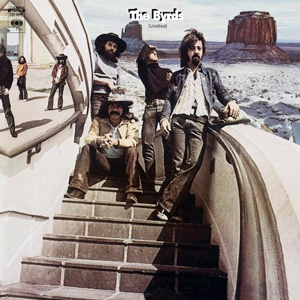
(Untitled) is the ninth album by the American rock band the Byrds and was released in September 1970 on Columbia Records. It is a double album, with the first LP featuring live concert recordings from early 1970, and a second disc consisting of new studio recordings. The album represented the first official release of any live recordings by the band, as well as the first appearance on a Byrds' record of new recruit Skip Battin, who had replaced the band's previous bass player, John York, in late 1969.

Byrds is the twelfth and final studio album by the American rock band the Byrds and was released in March 1973 on Asylum Records. It was recorded as the centerpiece of a reunion among the five original band members: Roger McGuinn, Gene Clark, David Crosby, Chris Hillman, and Michael Clarke. The last time that all five members had worked together as the Byrds was in 1966, prior to Clark's departure from the band. During the reunion, the current, latter-day lineup of the band continued to make live appearances until February 1973, with McGuinn being the only member common to both versions of the group.

The Byrds is a four-CD box set by the American rock band the Byrds. It features music that had previously been released between the mid-1960s and early 1970s, along with a number of previously unreleased tracks and some new recordings from 1990. The box set was issued on October 19, 1990, by Columbia/Legacy and reached number 151 on the Billboard albums chart.

The Essential Byrds is a comprehensive two-CD compilation album by the American rock band the Byrds. It was released in 2003 as part of Sony BMG's The Essential series. The Essential Byrds did not chart in the U.S. or the UK. A 3.0 edition of the compilation released in 2011 contains a third disc with six additional tracks: "Spanish Harlem Incident", "I Knew I'd Want You", "The World Turns All Around Her", "I See You", "Change Is Now", and "One Hundred Years from Now".

The Original Singles: 1965–1967, Volume 1 is a compilation album by American rock 'n' roll band the Byrds. Originally released in 1980, it offered, for the first time, all of the mono single versions of the Byrds' singles released between 1965 and early 1967. The tracks on the album are laid out chronologically by release date of the single, and features the A-side first, then the B-side. For example, the Byrds' first single was "Mr. Tambourine Man" with "I Knew I'd Want You" on the B-side. The next single was "All I Really Want to Do" with "I'll Feel a Whole Lot Better" on the B-side, and so forth.

The Original Singles: 1967–1969, Volume 2 is a compilation album by American rock band the Byrds.
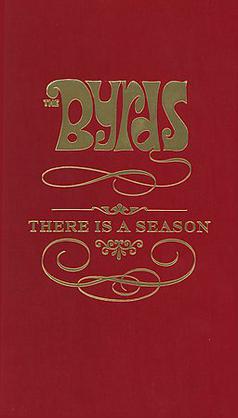
There Is a Season is a four-CD and one DVD box set by the American rock band the Byrds that was released on September 26, 2006 by Columbia/Legacy. It comprises 99 tracks and includes material from every one of the band's twelve studio albums, presented in roughly chronological order. The bonus DVD features ten clips of the Byrds lip-synching their hits on television programs between 1965 and 1967. Upon release, the box set failed to reach the Billboard 200 chart or the UK Albums Chart. There Is a Season supplants the band's earlier box set, The Byrds, which was released in October 1990.

"It Won't Be Wrong" is a song by the American folk rock band the Byrds, which appeared as the second track on their 1965 album, Turn! Turn! Turn! It was also coupled with the song "Set You Free This Time" for a single release in 1966, resulting in "It Won't Be Wrong" charting at number 63 on the Billboard Hot 100. The song was written by Byrds band member Jim McGuinn and his friend Harvey Gerst in 1964.

Preflyte is a compilation album by the American folk rock band the Byrds and was released in July 1969 on Together Records. The album is a collection of demos recorded by the Byrds at World Pacific Studios in Los Angeles during late 1964, before the band had signed to Columbia Records and become famous. It includes early demo versions of the songs "Here Without You", "You Won't Have to Cry", "I Knew I'd Want You", and "Mr. Tambourine Man", all of which appeared in re-recorded form on the band's 1965 debut album.

The Byrds' Greatest Hits Volume II is the second greatest hits album by the American rock band the Byrds. It was released in the United Kingdom and Europe on October 29, 1971, by CBS Records as a follow-up to the band's first compilation album, The Byrds' Greatest Hits. The album appeared following the band's successful appearance at the Lincoln Folk Festival in England on July 24, 1971, and according to band biographer Johnny Rogan may have been issued by CBS as a reaction to the band's previous studio album, Byrdmaniax, having failed to chart in the UK.

History of The Byrds is a double album compilation by the American rock band the Byrds and was released on May 18, 1973 by CBS Records. The compilation was released exclusively in Europe and the UK, peaking at number 47 on the UK Albums Chart, but it was also available in the United States as an import.

Never Before is a compilation album by the American rock band the Byrds, consisting of previously unreleased outtakes, alternate versions, and rarities. It was initially released by Re-Flyte Records in December 1987 and was subsequently reissued on CD in 1989, with an additional seven bonus tracks.

"She Don't Care About Time" is a song by American folk rock band the Byrds. It was released on a non-album single in October 1965, as the B-side to "Turn! Turn! Turn!". The song was written by Gene Clark, the Byrds' main songwriter between 1964 and early 1966. "She Don't Care About Time" was recorded during sessions for the group's second album Turn! Turn! Turn!. The song is on most of the band's hits compilations.
